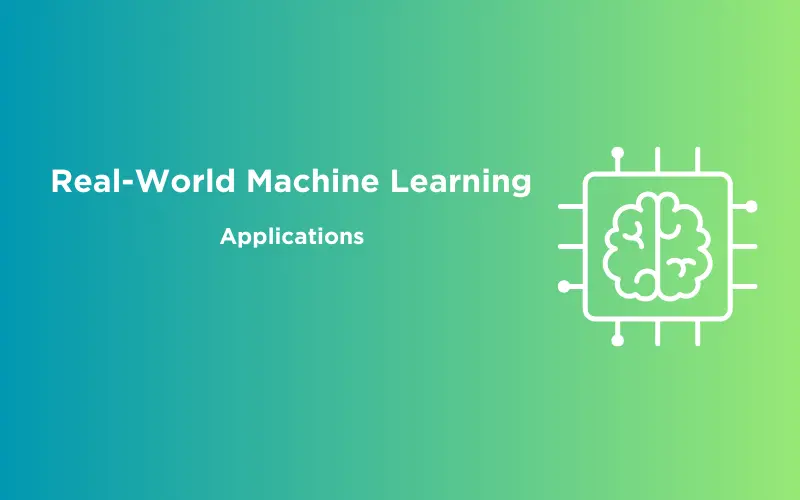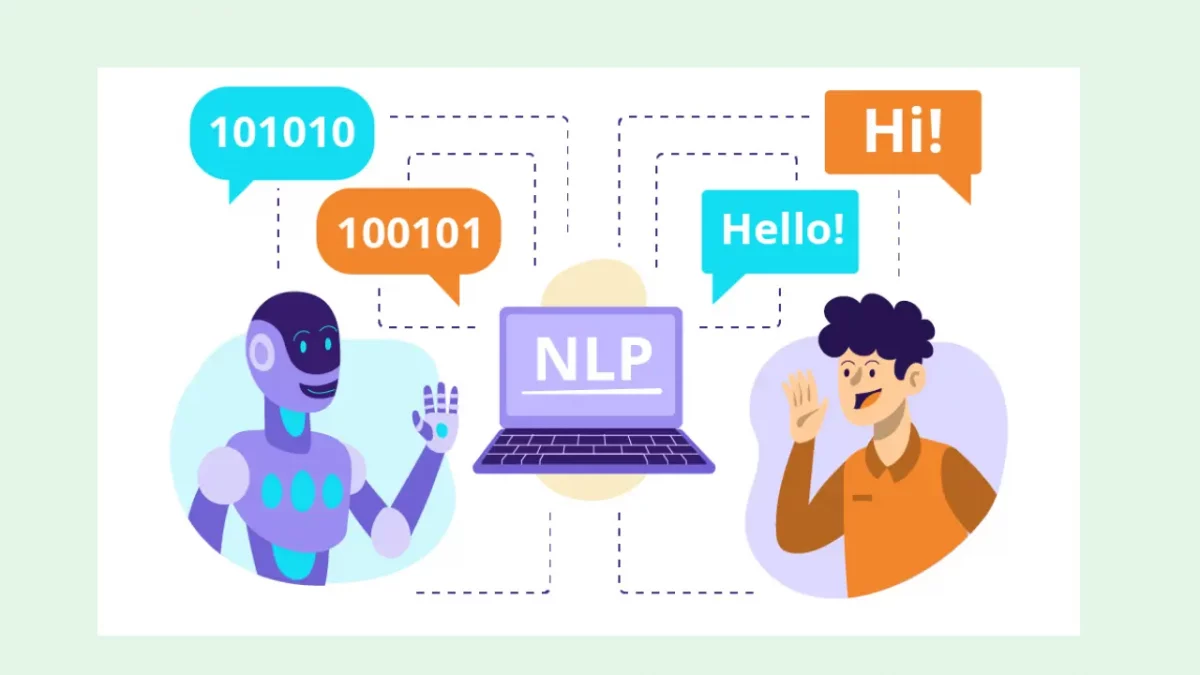
Real-World Machine Learning Applications
Mar 03, 2025 6 Min Read 3529 Views
(Last Updated)
We’re about to dive into something cool—machine learning in real life. Machine what, you ask? Well, it’s all about computers learning things on their own, and it’s not science fiction anymore. It’s happening right now, and it’s changing the way we do lots of things. Imagine a world where computers help doctors find illnesses, keep our money safe, recommend things we’d like to buy online, and even drive cars by themselves. That’s what we’re talking about today.
We’ll explore how machine learning is making healthcare better, keeping our money secure, making online shopping more fun, helping us talk to computers, making cars drive on their own, and making factories work smarter. But it’s not all sunshine and rainbows. We’ll also talk about the tricky stuff like fairness, privacy, and who’s responsible when things go wrong.
So, get ready to explore this amazing world where computers are like super-smart friends, helping us in all sorts of ways.
Table of contents
- Machine Learning in Healthcare
- Disease Diagnosis
- Personalized Medicine
- Predictive Analytics
- Imaging and Diagnostics
- Drug Discovery
- Machine Learning in Finance
- Fraud Detection
- Algorithmic Trading
- Credit Risk Assessment
- Customer Service and Chatbots
- Risk Management
- Machine Learning in E-commerce
- Recommendation Systems
- Customer Segmentation
- Supply Chain Optimization
- Chatbots and Customer Support
- Machine Learning in Natural Language Processing
- Chatbots
- Language Translation
- Machine Learning in Autonomous Vehicles
- Object Detection
- Navigation
- Safety and Collision Avoidance
- Advanced Driver Assistance Systems (ADAS)
- Machine Learning in Manufacturing
- Predictive Maintenance
- Quality Control
- Supply Chain Management
- Process Optimization
- Machine Learning in Environmental Monitoring
- Climate Modeling
- Wildlife Tracking
- Pollution Control
- Ethical Considerations in Machine Learning
- Importance of Ethical Guidelines and Transparency
- Impact of Ethical AI
- Conclusion
- FAQs
- What are some examples of real-world machine learning applications?
- How does machine learning impact privacy and data security?
- What role does ethics play in real-world machine learning applications?
Machine Learning in Healthcare

Healthcare is witnessing a revolution, and at the heart of it lies machine learning—a powerful technology that’s changing the way we diagnose, treat, and prevent diseases.
Make sure you understand machine learning fundamentals like Python, SQL, deep learning, data cleaning, and cloud services before we explore them in the next section. You should consider joining GUVI’s Artificial Intelligence & Machine Learning Course, which covers tools like Pyspark API, Natural Language Processing, and many more and helps you get hands-on experience by building real-time projects.
Also, if you want to explore Python through a Self-paced course, try GUVI’s Python course.
1. Disease Diagnosis
One of the most promising applications of machine learning in healthcare is disease diagnosis. Computers can now help doctors identify diseases more accurately and quickly, leading to better treatments and outcomes. IBM’s Watson for Oncology is an AI system that analyzes patient data and medical literature to recommend personalized cancer treatment plans. This technology helps oncologists make more informed decisions, resulting in tailored treatments for patients.
2. Personalized Medicine
Machine learning is enabling a shift towards personalized medicine, where treatments are customized to each patient’s unique genetic makeup and medical history. This approach promises better results and fewer side effects. 23andMe uses machine learning to analyze your DNA and provide personalized health reports. It can predict your genetic predisposition to certain diseases and even help you find the right medication based on your genes.
3. Predictive Analytics
Machine learning can predict health trends and outbreaks, allowing healthcare providers to allocate resources more efficiently and respond proactively to public health crises. Google’s Flu Trends uses search data to predict flu outbreaks in real-time. By analyzing search queries related to flu symptoms, Google can provide early warnings to healthcare officials.
4. Imaging and Diagnostics
Machine learning has improved medical imaging, making it easier to detect and diagnose diseases from X-rays, MRIs, and CT scans. PathAI uses machine learning to assist pathologists in diagnosing diseases from pathology slides. This technology helps pathologists identify cancerous cells with higher accuracy.
5. Drug Discovery
Machine learning accelerates drug discovery by analyzing vast datasets to identify potential drug candidates and their interactions with diseases. Atomwise employs AI-driven drug discovery to find new treatments for diseases. By simulating how drugs interact with proteins, they’ve identified promising drug candidates for various illnesses.
Machine Learning in Finance
The financial industry is experiencing a significant transformation thanks to machine learning—a technology that’s reshaping everything from how we detect fraud to how we trade stocks and assess credit risks.
1. Fraud Detection

Machine learning is a game-changer when it comes to fraud detection. By analyzing vast amounts of transaction data, it can identify suspicious activities and protect both financial institutions and customers. PayPal employs machine learning to detect fraudulent transactions. Their system analyzes customer transactions in real-time, allowing them to stop fraudulent activities before they cause harm.
2. Algorithmic Trading
Machine learning algorithms are used for algorithmic trading, where computers make split-second trading decisions based on market data. This leads to faster and more efficient trading strategies. Renaissance Technologies, a hedge fund, uses machine learning for high-frequency trading. Their Medallion Fund has achieved remarkable returns, partly attributed to their machine learning-driven strategies.
3. Credit Risk Assessment
Machine learning helps financial institutions assess credit risks more accurately. It can analyze credit histories and other data to determine an applicant’s creditworthiness. ZestFinance is a fintech company that uses machine learning to assess credit risk for borrowers who lack traditional credit histories. Their technology has increased access to credit for underserved populations.
4. Customer Service and Chatbots

Machine learning-powered chatbots and virtual assistants enhance customer service by providing quick responses to customer inquiries and assisting with account-related tasks. Bank of America’s virtual assistant, Erica, uses machine learning to answer customer questions, provide financial insights, and assist with banking transactions.
5. Risk Management
Financial institutions employ machine learning for risk management. It can identify potential risks, monitor market conditions, and optimize investment portfolios. BlackRock, one of the world’s largest asset management companies, uses machine learning in its Aladdin platform to manage risk and optimize investment decisions for clients.
Machine Learning in E-commerce

E-commerce is no longer just about clicking and buying. It’s about personalized recommendations, targeted marketing, and streamlined supply chains—all made possible by machine learning.
1. Recommendation Systems
Machine learning powers recommendation engines that suggest products to customers based on their past behavior and preferences. This keeps customers engaged and increases sales. Amazon’s recommendation system uses machine learning to suggest products to customers. It’s estimated that 35% of Amazon’s sales come from these recommendations.
2. Customer Segmentation
Machine learning helps e-commerce companies segment their customers effectively, allowing for tailored marketing campaigns and personalized experiences. Stitch Fix, a clothing subscription service, uses machine learning to analyze customer preferences and send them personalized clothing items. This approach has led to increased customer retention.
3. Supply Chain Optimization
Machine learning optimizes supply chain management by predicting demand, optimizing inventory, and reducing shipping costs. Alibaba uses machine learning to predict demand and optimize inventory for its e-commerce operations. This has led to a 10% increase in sales and a 5% reduction in inventory costs.
4. Chatbots and Customer Support
E-commerce companies use machine learning-driven chatbots to provide instant customer support, answer queries, and improve overall customer satisfaction. Sephora employs a chatbot for customer support, helping customers find products and answer beauty-related questions. This has led to an 11% increase in bookings.
Machine Learning in Natural Language Processing

Natural Language Processing (NLP) is a branch of artificial intelligence that focuses on the interaction between computers and human language. Machine learning plays a crucial role in NLP by enabling computers to understand, interpret, and generate human language.
1. Chatbots
Chatbots are computer programs that use machine learning to understand and respond to human language. They provide instant support, answer questions, and perform tasks, making them valuable for customer service and engagement. Google’s Chatbot, Meena, is trained using reinforcement learning. It can hold natural conversations with users, making it a powerful tool for improving customer support and engagement.
2. Language Translation
Machine learning has revolutionized language translation. Advanced neural machine translation models use deep learning to translate text with remarkable accuracy across multiple languages. Google Translate uses machine learning to provide instant translations for over 100 languages. It facilitates communication across borders and cultures.
Machine Learning in Autonomous Vehicles
Autonomous vehicles, often referred to as self-driving cars, are no longer a concept from science fiction. They’re a reality, thanks to the power of machine learning.
1. Object Detection
Object detection is a critical component of autonomous vehicles. Machine learning algorithms analyze data from sensors like cameras, lidar, and radar to identify and track objects on the road, such as vehicles, pedestrians, and obstacles. Tesla’s Autopilot uses machine learning for object detection and has achieved impressive results in real-world scenarios. It assists with lane-keeping, adaptive cruise control, and automatic lane changes.
2. Navigation
Machine learning is essential for autonomous vehicles to plan routes, make decisions, and safely navigate through complex environments, including urban streets and highways. Waymo, a subsidiary of Alphabet Inc. (Google’s parent company), has developed self-driving technology that has logged millions of miles on public roads. Their vehicles use machine learning for navigation and have achieved a high level of autonomy.
3. Safety and Collision Avoidance
Machine learning is employed to predict and prevent collisions by analyzing sensor data and making split-second decisions to avoid accidents. NVIDIA, a technology company, has developed the NVIDIA DRIVE platform, which uses deep learning for safety and collision avoidance in autonomous vehicles. It’s used by various automakers and tech companies.
4. Advanced Driver Assistance Systems (ADAS)
Many modern vehicles are equipped with ADAS features that use machine learning for tasks like adaptive cruise control, lane-keeping, and automatic emergency braking. Mobileye, an Intel company, provides ADAS technology to numerous automakers. Their systems use machine learning to enhance driver safety and have been adopted in millions of vehicles.
Machine Learning in Manufacturing
Manufacturing has entered a new era of productivity and precision with the integration of machine learning.
1. Predictive Maintenance
Machine learning algorithms analyze data from sensors and machinery to predict when equipment is likely to fail. This enables manufacturers to schedule maintenance before breakdowns occur, reducing downtime and costs. General Electric (GE) employs machine learning for predictive maintenance in their aircraft engines. By monitoring engine data in real-time, they’ve achieved up to 20% reduction in unscheduled maintenance.
2. Quality Control
Machine learning enhances quality control by identifying defects and anomalies in real time during the manufacturing process, ensuring that only high-quality products reach the market. Siemens uses machine learning for quality control in automotive manufacturing. Their system detects defects during vehicle assembly, leading to improved product quality.
3. Supply Chain Management
Machine learning optimizes supply chain management by predicting demand, reducing excess inventory, and optimizing logistics, leading to cost savings and improved efficiency. Alibaba uses machine learning for supply chain optimization. By analyzing data from its e-commerce platforms, they’ve reduced delivery times by 30% and cut costs significantly.
4. Process Optimization
Machine learning algorithms fine-tune manufacturing processes to improve efficiency and reduce waste. They can optimize parameters such as temperature, pressure, and speed for maximum productivity. Bosch uses machine learning to optimize production processes in their factories. This has resulted in a 25% reduction in energy consumption and increased production capacity.
Machine Learning in Environmental Monitoring
Environmental conservation is a global imperative, and machine learning is emerging as a powerful ally in the fight against climate change, habitat loss, and pollution.
1. Climate Modeling
Machine learning aids climate scientists in developing accurate climate models. These models help predict climate changes, extreme weather events, and their impact on ecosystems. Google’s DeepMind uses machine learning to improve climate prediction models. Their technology can help increase the accuracy of short-term weather forecasts and, consequently, improve disaster preparedness.
2. Wildlife Tracking
Machine learning enables the tracking and conservation of wildlife through techniques like camera traps and satellite imagery. It helps identify species, monitor populations, and protect endangered animals. Conservationists use machine learning to identify and count animals in camera trap photos. This technology aids in monitoring species like tigers and leopards, contributing to their conservation.
3. Pollution Control
Machine learning monitors air and water quality by analyzing data from sensors and satellites. It helps identify pollution sources, predict pollution levels, and enforce regulations. Aclima, a technology company, uses machine learning to map air quality in urban areas. Their data-driven insights support local governments and organizations in reducing air pollution.
Ethical Considerations in Machine Learning

Machine learning has immense potential, but it also raises ethical concerns that need to be carefully addressed.
2. Data Privacy
Importance of Ethical Guidelines and Transparency
Impact of Ethical AI
Addressing ethical concerns in machine learning has a profound impact:
- Fairness
- Trust
- Accountability
- Sustainability
Machine learning has the potential to benefit society in countless ways, but its success depends on ethical considerations. By addressing issues like bias, data privacy, and responsible deployment, we can harness the power of AI for the greater good while minimizing harm.
Ethical AI isn’t a luxury; it’s a necessity for a fair, inclusive, and sustainable future.
Kickstart your Machine Learning journey by enrolling in GUVI’s Artificial Intelligence & Machine Learning Course where you will master technologies like matplotlib, pandas, SQL, NLP, and deep learning, and build interesting real-life UI/UX projects.
Alternatively, if you want to explore Python through a Self-paced course, try GUVI’s Python certification course.
Conclusion
Looking ahead, there’s a lot more we can do with machine learning. New ideas like sharing knowledge without sharing our secrets and super-fast computers will bring exciting changes. But, we also need to be careful about how we use this technology.
So, keep learning about machine learning, stay curious, and always think about what’s right and fair. With the right choices, machine learning can make our future even better!
FAQs
Real-world machine learning applications are diverse. They include things like self-driving cars, where machines learn to drive without human help. In healthcare, machines can predict diseases or help doctors analyze medical images.
In finance, machine learning can detect fraud, and in e-commerce, it powers recommendation systems. The list goes on, and machine learning is becoming a part of everyday life.
Machine learning relies on large amounts of data to learn and make predictions. While this can lead to valuable insights, it also raises concerns about privacy and data security. Personal information can be misused or stolen if not protected properly.
That’s why there are strict rules and regulations to ensure that machine learning systems respect privacy and keep data safe.
Ethics are crucial in machine learning. Biased algorithms can discriminate against certain groups of people, and automated decisions can have real-life consequences. It’s important to make sure that machine learning is used fairly, transparently, and responsibly.
Ethical guidelines and discussions are essential to ensure that AI benefits society without causing harm or unfairness.

























Did you enjoy this article?